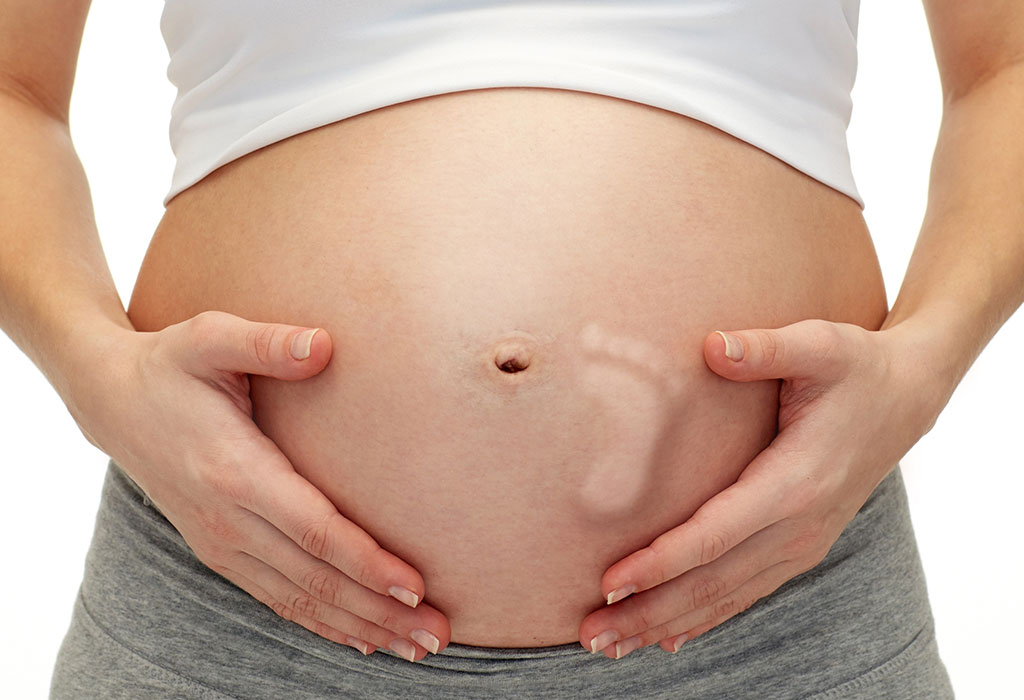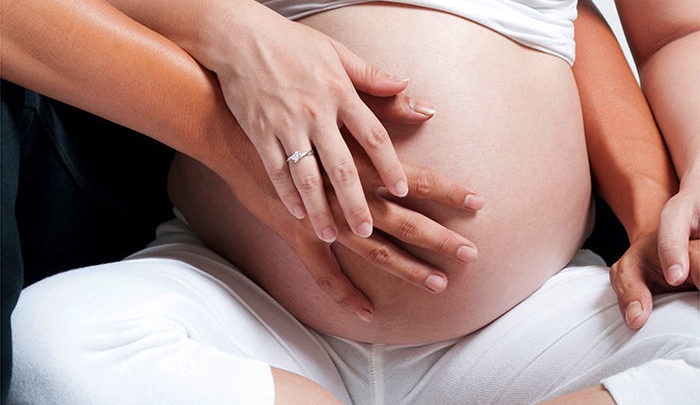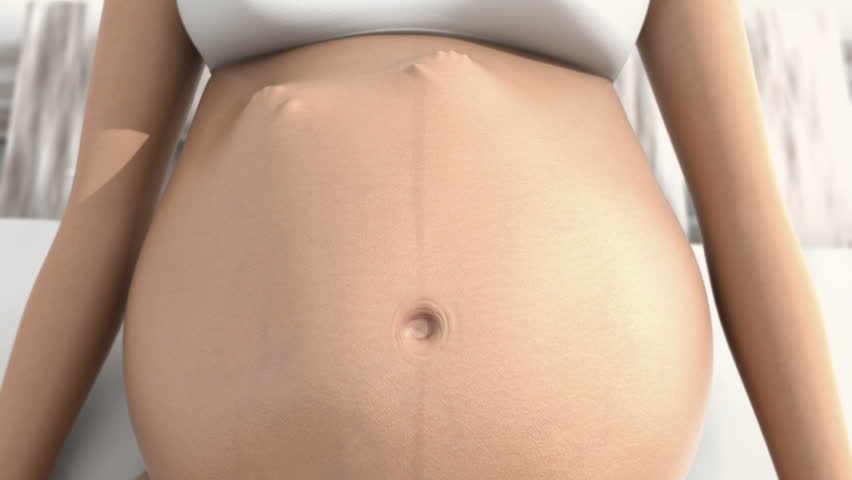If you're pregnant, you may have experienced your baby kicking by now. Kicking is one way your baby communicates with you and is usually their way of telling you they're doing well. You'll start to feel your baby move around 16 to 18 weeks into your pregnancy, but some women feel them sooner and others don't feel them until later.
Don't worry if you can't feel your baby kicking right away – every mom-to-be experiences pregnancy differently. Some women feel their baby kick all the time, while others only feel a few kicks a day. As long as your doctor hasn't told you there's a problem, it's normal not to feel your baby kick as often once you get further along in your pregnancy.
Why am I feeling baby movement in my lower abdomen?
Some women say they can feel their baby "flip" or move because there's less room in the uterus to make, so it's common to feel your baby moving down toward your cervix. You may also find that you don't always notice when baby moves because of the size difference between you and them (you're bigger than your little one right now).

What do baby kicks feel like?
Most women describe baby kicks as flutter, punch, or kick. Some women say that the baby's movements are more noticeable later in the day because they have more energy then. And others find that eating or drinking something can make baby move more.
How will I know if my baby is in trouble?
If you're at all concerned about your baby's movement, always speak to your doctor. Sometimes decreased fetal movement can be a sign that the baby isn't getting enough oxygen, so it's important to get checked out. But again, most of the time there's no cause for concern – just remember that every mom-to-be experiences pregnancy differently. Enjoy this special time with your little one!
So if you're feeling a bit of a flutter in your lower abdomen, or if you're just waiting for that first kick, know that you're not alone. Millions of other women have felt their baby kicking too – it's just one more way that your baby is communicating with you.
Location matters
You may be able to feel your baby kicking in different areas of your abdomen at different points in your pregnancy. If you're enjoying the kicks close to your belly button, it's probably gas moving through your intestines. You might start feeling some lower abdominal movements around 24 or 25 weeks into the pregnancy when the baby is big enough for you to feel them more easily. It can also take time for you and your baby to adjust to all their new sensations after birth, so don't worry if it takes a while before you can tell what your little one is up to.

Is it a boy or a girl?
You may have been hoping to find out if you're having a boy or girl when you have your 20-week ultrasound, but some moms can tell even earlier! Your baby usually releases more testosterone while they're in the womb, which means that their kicks and movements tend to feel stronger and more deliberate. If you're carrying low (which is common for all pregnancies) and feeling your baby's lower abdominal movements, it's very likely that you're feeling a little dude.
What should I do if I'm worried about my baby kicking less?
If you still don't feel your baby move at least 10 times in two hours after 28 weeks of pregnancy ( 15 times in two hours after 32 weeks), contact your doctor. A decrease in fetal movement can be a sign of placental insufficiency, which means that your placenta isn't working the way it should. If this is happening, you may need to have an ultrasound or CTG monitoring done for more information on how well the baby is doing.
How often should I feel my baby kicking?
As early as 14 weeks into pregnancy, some women are able to feel their little one kick or wiggle up to 50 times an hour! The average range of movements each day is between 10 and 30. By 20 weeks, most moms-to-be are feeling around 15 kicks in two hours. After 28 weeks of pregnancy (32 after week 32), you probably won't be able to feel the baby kicking as often – just five movements in two hours. At the end of pregnancy, you should only feel your baby move a few times a day.
What if I can't feel my baby moving?
A lack of fetal movement is known as fetal akinesia or hypokinesia, and it's most common between 28 and 32 weeks pregnant. In some cases, this means that there may not be enough amniotic fluid surrounding the baby (oligohydramnios). More commonly, though, this happens because your little one has moved into a breech position or is lying transversely across your uterus instead of head down with their spine toward your back.
If you're still waiting to feel more movement from your baby after 28 weeks of pregnancy, you may want to get more active during the day. You can do this by taking a walk or going up and down the stairs for about 20 minutes each time. Call your doctor if you don't feel anything at all (or very little) in two hours. If this happens when you're sleeping, it's important that you wake up and check for movements every few hours in case something is wrong with your baby.
Do baby kicks hurt?
Kicks are normal, but if you feel strong pains or cramps when the baby moves around, go ahead and call your doctor. Sometimes, your muscles can tense up when the baby gets busy causing pain (sometimes called "practice contractions"), so this is nothing to worry about. If you have a high-risk pregnancy or history of preterm labor, always contact your doctor first with any concerns.

What do different kinds of movements mean?
You may notice that some kicks are harder than other ones – these don't necessarily cause concern as it could just be a matter of how much room there is in your uterus at any given time. In general, though: Sometimes you'll feel movement as fluttering feelings, bubbles, or gas.
Rolling, stretching, and somersaults are also common.
Kicks that feel like a quick jab are usually the baby's way of telling you they're doing well.
If you experience any strange or worrying movements, always contact your doctor just to be safe!
Activity level
Depending on how active your baby is, they may kick almost constantly in the last few weeks of gestation (when mom-to-be feels movements the most). Kicks and punches may seem more forceful at this point, but always remember that your baby's movements can vary from day to day. If you're ever concerned about how often – or how hard – your baby is moving, talk to your health care provider. They'll be able to reassure you that everything is okay and help put your mind at ease.
When should I start feeling my baby kick?
You'll probably begin to feel your baby move sometime around 16 weeks into your pregnancy, but every woman is different. Your doctor will check for movement at each prenatal visit starting at 28 weeks into pregnancy . At this point, if you haven't felt any movement yet, your doctor might use a doppler device to try to pick up the sound of your baby's heartbeat, which might help you feel more movement.
What can I do to help my baby move?
You cannot make your baby kick or wiggle around inside your belly – they do it when they're ready. Some women swear by using a peanut ball (a small rubber ball that helps prop up your belly) to encourage kicking. Others say that drinking cold water will make their baby move more often. There are no scientific studies suggesting either of these techniques work, but some moms have found them helpful!
Can I feel the kicks of two babies at once?
Yes! This is known as "twins on the belly." However, if you haven't done any gender tests, this may not be apparent until later in your pregnancy when the babies get bigger. You may also feel more movement if you're carrying twins high or low.
Your baby's movements are usually a good sign, and most doctors consider them reassuring evidence that your little one is doing well inside the womb. If you have any concerns, be sure to talk to your doctor. They'll be able to answer any questions you have and help put your mind at ease.

Third-trimester movement
Kicks and punches may seem more forceful at this point, but always remember that your baby's movements can vary from day to day. If you're ever concerned about how often – or how hard – your baby is moving, talk to your health care provider. They'll be able to reassure you that everything is okay and help put your mind at ease.
Any kind of movement, no matter how big or small, are a good sign. Don't worry about what your baby is doing inside the womb – they know what they're doing! Always contact your doctor if you have any concerns about how often – or how hard – your baby is moving.
When to check with your doctor
If your baby is in a breech position, your doctor will check for movement at each prenatal visit starting at 28 weeks into pregnancy. If you have any concerns about how often – or how hard – your baby is moving, talk to your health care provider. They'll be able to reassure you that everything is okay and help put your mind at ease.
Conclusion
Your baby's movements are usually a good sign, and most doctors consider them reassuring evidence that your little one is doing well inside the womb. If you have any concerns, be sure to talk to your doctor. They'll be able to answer any questions you have and help put your mind at ease.
"Rolling," "stretching," and "somersaults" are all common types of fetal movement in the third trimester of gestation [the period between weeks 27-40]. Kicks that feel like a quick jab are usually the baby's way of telling mom they're doing OK. If she experiences any strange or worrying movements, always contact her health care provider to make sure everything is alright. The activity level of an unborn baby in the third trimester usually indicates a healthy pregnancy. So moms-to-be, relax and enjoy those final weeks of feeling your little one move around! You're almost there!